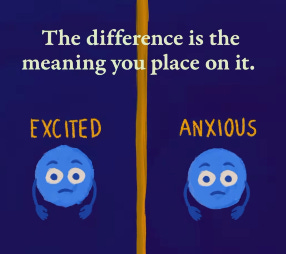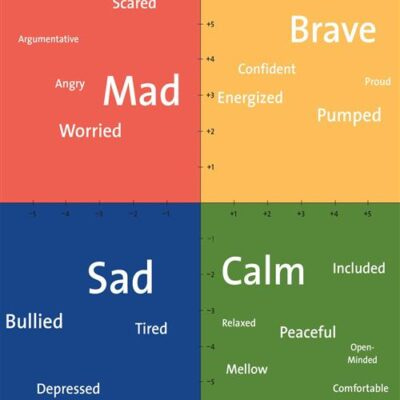Five Slices #14: All about feelings
Cognitive reframing, special words, the emotion app, Feynman's love letter, smiling in a dictatorship
Welcome to Five Slices! In every post, I share five pieces from science, history, culture, psychology, business, and art. Sign up here to get these stories in your inbox:
You can check out the complete list of stories here.
Same feeling, different meaning
The limits of my language mean the limits of my world.
– Wittgenstein
Is your happiness the same as my happiness? To you, happiness might bring back memories of laying on a beach listening to the waves hit the shore. To me, it could mean a piece of chocolate or the ecstatic high of beating a level of Hades. To another person, it could be the warmth of hearing their baby’s laughter.
It’s not that one kind of happiness here is greater or lesser than the other. It’s just that we’re trying to group very different experiences under the same category because they vaguely resemble each other. Emotions aren’t just something we “feel”, they’re something we actively construct.
Let’s try an example: Say you drive an F1 car and it goes really fast. If it’s your first time trying this and you have no idea how to control the car, you might feel fear. But to an experienced driver, the same feeling might come across as excitement.
Emotions have two parts, the physical change you feel in your body, and the meaning that you associate with it. Even if you had the same physical change as the F1 driver, your past experiences, culture, and interests will give you different meanings for the same situation. This combination of physical change and meaning is how you “construct” your emotion.
If you understand this, you can actively use this to do something called “cognitive reframing.” Instead of trying to change what you feel, you could accept what you feel and change the meaning you place on it. For example, maybe you are anxious about a speech you have to give: Instead of telling yourself to “relax”, you can visualize the speech going really well. You aren’t denying your fear. You’re only channeling it into excitement which feels physically similar.
Cory Muscara does a much better job of explaining this than me, and you can check it out if you’re interested. I’ve found this tool helpful in many situations.
Foreign words for familiar feelings
The more emotions you have in your vocabulary that you can make, the more resilient and emotionally intelligent you’ll be, and the better able you’ll be to communicate across cultures and even across time.
– Lisa Feldman Barrett, neuroscientist and psychologist
Have you ever googled your symptoms when you’ve started sneezing or had a mild headache, and then panicked thinking you were sick with an unpronounceable disease? That feeling has a name. It’s called Cyberchondria.
There are some fascinating words in other languages for fleeting or subtle emotions that we never really think about. These are some from “The book of human emotions” by Tiffany Smith:
The Japanese word “amae” is the urge to crumple into the arms of a loved one to be coddled and comforted in a temporary surrender to perfect safety. It’s similar to the Dutch word “gezelligheid,” the feeling of being snug and cozy among good friends. It’s similar to Danish “hygge” and Finnish “kodikas” (or Tamil “sogusu”?)
When a guest is about to visit your house, do you keep looking out of the window imagining that you heard the revving of their car? The Inuits of the Arctic called that feeling of anticipation iktsuarpok (pronounced eet-so-ahr-pohk). After guests have left, there is an emptiness that causes the walls to echo and make the space feel vacuous… A fuzzy feeling of pointlessness that the Baining people of New Guinea call Awumbuk.
Dolce Far Niente is the “sweetness of doing nothing” (in Italian). L’Appel Du Vide or “the call of the void” is the scary urge to jump that you may unconsciously feel when looking down from a high place. If you’ve ever felt like throwing a pile of papers out of the window or scattering a pile of neatly arranged marbles, you’ve experienced Ilinx, the strange excitement of wanton destruction.
Sometimes we feel homesick for a place that we’ve never known. The Finnish call this Kaukokaipuu. Hiraeth is the opposite, a Welsh word of yearning due to a deep connection with your homeland.
Han is a Korean word that is deeply sad and hopeful at the same time… An acceptance of suffering along with a quiet yearning for things to be different. The Ifaluk of the Coraline islands express a similar sentiment with Fago – a feeling of pity that compels us to care for the people we love, with an overwhelming feeling that life and our love is fragile and temporary.
Greng jai is the feeling of reluctance to accept another person’s offer to help because of the bother it would cause them. (In Coastal Karnataka, they call this feeling Daakshanya. When I see this in action, I experience a special feeling called extreme annoyance).
These are all real words used by real cultures, but there are also words that are invented by people for feelings that have no words (If you’ve made up your own words along with friends, you know how this works). There’s a site called The Dictionary of Obscure Sorrows for invented words like this. My favorite is the word “Sonder,” the feeling of realization that everyone has a story as complex and as rich as yours and that you’ll never quite be able to experience it:
“How we feel” app
One way to get better at handling emotions is to feel them and understand them better. But I sometimes find it hard to remember how I felt and what made me feel that way. When I’m angry, I don’t remember I was happy three days back. When I’m happy, I forget why I was sad in the first place. One way I deal with this is by maintaining a journal in which I write every day regardless of how I’m feeling. I might find it hard to make sense of my feelings in the moment, but I can sometimes connect the dots looking back.
An easier way is to use this app called “How we feel” developed by the Yale University.
The idea is that your feelings are either:
“High energy” or “Low energy”
“High pleasantness” or “Low pleasantness”
For example, anger is “High energy, low pleasantness”, happiness is “High energy, high pleasantness”, sadness is “Low energy, low pleasantness”, and being relaxed is “Low energy, high pleasantness.” You check in regularly with the app through the day with a small note (e.g Angry, “Was stuck in traffic”).
After a few days, you can see how much time you are spending in each state, and what’s making you feel that way.
Feynman’s love letter to his wife
It’s Valentine’s day. So let’s read the love letter Richard Feynman wrote to his wife Arline, many years before he won the Nobel Prize in Physics:
October 17, 1946
D’Arline,
I adore you, sweetheart.
I know how much you like to hear that — but I don’t only write it because you like it — I write it because it makes me warm all over inside to write it to you.
It is such a terribly long time since I last wrote to you — almost two years but I know you’ll excuse me because you understand how I am, stubborn and realistic; and I thought there was no sense to writing.
But now I know my darling wife that it is right to do what I have delayed in doing, and that I have done so much in the past. I want to tell you I love you. I want to love you. I always will love you.
I find it hard to understand in my mind what it means to love you after you are dead — but I still want to comfort and take care of you — and I want you to love me and care for me. I want to have problems to discuss with you — I want to do little projects with you. I never thought until just now that we can do that. What should we do. We started to learn to make clothes together — or learn Chinese — or getting a movie projector. Can’t I do something now? No. I am alone without you and you were the “idea-woman” and general instigator of all our wild adventures.
When you were sick you worried because you could not give me something that you wanted to and thought I needed. You needn’t have worried. Just as I told you then there was no real need because I loved you in so many ways so much. And now it is clearly even more true — you can give me nothing now yet I love you so that you stand in my way of loving anyone else — but I want you to stand there. You, dead, are so much better than anyone else alive.
I know you will assure me that I am foolish and that you want me to have full happiness and don’t want to be in my way. I’ll bet you are surprised that I don’t even have a girlfriend (except you, sweetheart) after two years. But you can’t help it, darling, nor can I — I don’t understand it, for I have met many girls and very nice ones and I don’t want to remain alone — but in two or three meetings they all seem ashes. You only are left to me. You are real.
My darling wife, I do adore you.
I love my wife. My wife is dead.
Rich.
PS Please excuse my not mailing this — but I don’t know your new address.
I’m sorry about springing that letter on you. It’s something I found really moving and wanted to share. Feynman wrote it sixteen months after his wife died following her long struggle with tuberculosis. But I have one more thing to share that’ll end things on a different note…
Hope in the darkest places
Remember the word “Han” that I mentioned above? It’s a Korean word meaning quiet acceptance of suffering while yearning for a different future. That’s kind of how people in North Korea live their lives – their lives are so tightly controlled by authoritarian dictators that even what they believe and what they feel is controlled by the government (Read this article by Tim Urban to learn how weird the place is).
Which is why this video caught my attention. A magician traveled the world with the intention of making people smile, and he also got to perform in North Korea (though he was heavily guarded at all times). It’s heartwarming to see how the kids react to his magic:
There’s a lot you can suppress, but you can’t suppress laughter.1
If you want to read one more post, check out this one I wrote about Time Games. If you want to read something longer, here’s the story of how my friend and I cloned a billion dollar company.
If you enjoyed reading, please like the post and share it with a friend. It supports my writing by letting more people see these posts:
Unfortunately, my teachers didn’t seem to understand this because they kept throwing me out of class for laughing at jokes my friends cracked.





